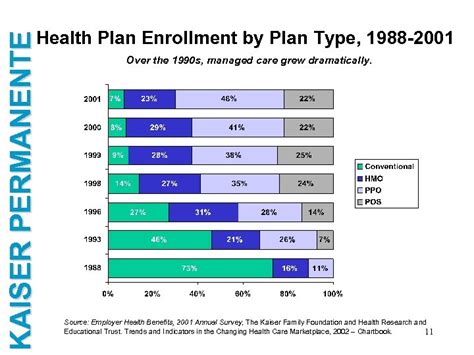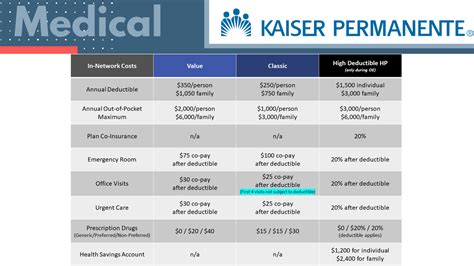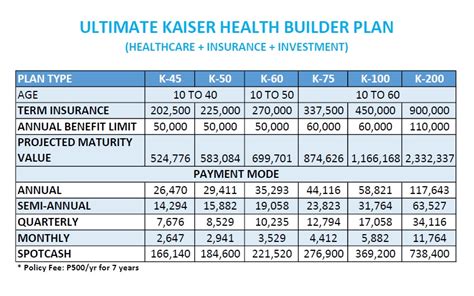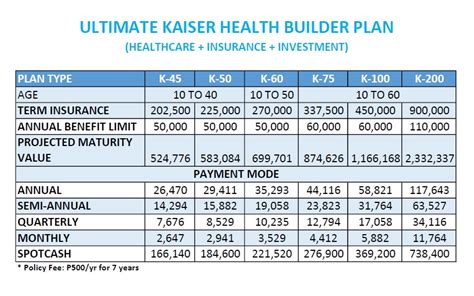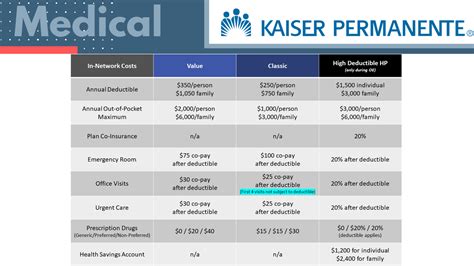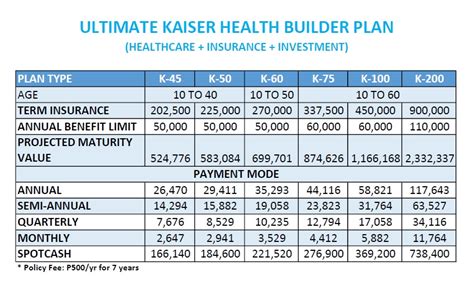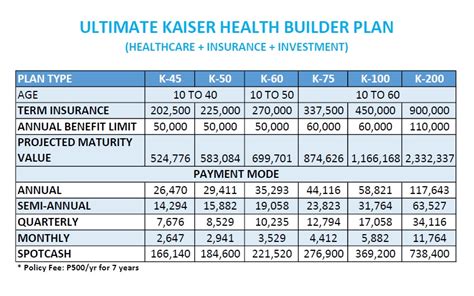The health insurance landscape in the United States is complex and multifaceted, with numerous providers offering a wide range of plans to suit different needs and budgets. Among these, Kaiser Health Plans have emerged as a popular choice for many individuals and families. With a strong focus on preventive care, comprehensive coverage, and innovative healthcare delivery models, Kaiser Health Plans have established themselves as a leader in the health insurance market. In this article, we will delve into the world of Kaiser Health Plans, exploring their history, benefits, and what sets them apart from other health insurance providers.
Kaiser Health Plans have a rich history that dates back to the 1930s, when Henry J. Kaiser, an industrialist and entrepreneur, began offering health insurance to his employees. This pioneering effort laid the foundation for the modern health maintenance organization (HMO) model, which emphasizes preventive care, coordination of services, and cost-effective delivery of healthcare. Today, Kaiser Health Plans serve millions of members across the United States, offering a diverse range of plans that cater to various demographics, including individuals, families, and employers.
The importance of choosing the right health insurance plan cannot be overstated. With the rising costs of healthcare, having adequate coverage can make all the difference in ensuring access to quality medical care, managing health expenses, and achieving peace of mind. Kaiser Health Plans recognize this need and have designed their plans to provide comprehensive coverage, flexibility, and affordability. By understanding the benefits and features of Kaiser Health Plans, individuals and families can make informed decisions about their health insurance needs and select a plan that aligns with their priorities and budget.
Introduction to Kaiser Health Plans
Kaiser Health Plans operate on the principles of integrated care, which means that members have access to a wide range of healthcare services, from primary care and specialty care to hospital services and pharmacy benefits. This integrated approach allows for better coordination of care, improved health outcomes, and enhanced patient satisfaction. Moreover, Kaiser Health Plans are known for their emphasis on preventive care, encouraging members to take an active role in maintaining their health through regular check-ups, screenings, and healthy lifestyle choices.
Benefits of Kaiser Health Plans
The benefits of Kaiser Health Plans are numerous and varied. Some of the key advantages include:
* Comprehensive coverage: Kaiser Health Plans offer broad coverage for medical, hospital, and pharmacy services, ensuring that members have access to the care they need.
* Preventive care focus: By emphasizing preventive care, Kaiser Health Plans help members stay healthy and avoid costly medical interventions.
* Integrated care model: The integrated care approach ensures that members receive coordinated, high-quality care from a team of healthcare professionals.
* Affordable premiums: Kaiser Health Plans are designed to be affordable, with competitive premiums that make quality healthcare accessible to a wide range of individuals and families.
* Extensive network: Kaiser Health Plans have an extensive network of healthcare providers, giving members a wide range of choices for their medical care needs.
Types of Kaiser Health Plans
Kaiser Health Plans offer a variety of plans to suit different needs and budgets. These include:
* HMO plans: These plans provide comprehensive coverage for medical, hospital, and pharmacy services, with an emphasis on preventive care and coordination of services.
* PPO plans: These plans offer more flexibility, allowing members to see any healthcare provider they choose, both in and out of network.
* Medicare Advantage plans: These plans are designed for Medicare-eligible individuals, providing comprehensive coverage and additional benefits such as dental, vision, and hearing care.
* Medicaid plans: These plans provide coverage for low-income individuals and families, offering essential health benefits and access to quality care.
How Kaiser Health Plans Work
Kaiser Health Plans operate on a simple, member-centric model. Here's how they work:
1. Members choose a primary care physician (PCP) from Kaiser's network of healthcare providers.
2. The PCP serves as the member's gateway to the healthcare system, providing routine care, referrals to specialists, and coordination of services.
3. Members have access to a wide range of healthcare services, including medical, hospital, and pharmacy benefits.
4. Kaiser Health Plans emphasize preventive care, encouraging members to take an active role in maintaining their health through regular check-ups, screenings, and healthy lifestyle choices.
Advantages of Kaiser Health Plans
The advantages of Kaiser Health Plans are numerous and significant. Some of the key benefits include:
* High-quality care: Kaiser Health Plans are known for their commitment to quality care, with a focus on preventive medicine, coordination of services, and patient satisfaction.
* Cost-effective: Kaiser Health Plans are designed to be cost-effective, with competitive premiums and out-of-pocket costs.
* Comprehensive coverage: Kaiser Health Plans offer broad coverage for medical, hospital, and pharmacy services, ensuring that members have access to the care they need.
* Innovative healthcare delivery: Kaiser Health Plans are at the forefront of healthcare innovation, with a focus on telemedicine, digital health tools, and personalized medicine.
Kaiser Health Plans and Preventive Care
Kaiser Health Plans place a strong emphasis on preventive care, recognizing the importance of early intervention and health promotion in maintaining optimal health. Some of the preventive care services offered by Kaiser Health Plans include:
* Routine check-ups and screenings
* Vaccinations and immunizations
* Health education and counseling
* Chronic disease management
* Mental health and substance abuse services
Kaiser Health Plans and Chronic Disease Management
Kaiser Health Plans recognize the importance of chronic disease management in improving health outcomes and reducing healthcare costs. Some of the chronic disease management services offered by Kaiser Health Plans include:
* Diabetes management
* Heart disease management
* Asthma management
* Chronic obstructive pulmonary disease (COPD) management
* Mental health and substance abuse services
Kaiser Health Plans and Mental Health
Kaiser Health Plans recognize the importance of mental health in overall well-being, offering a range of services to support members' mental health needs. Some of the mental health services offered by Kaiser Health Plans include:
* Counseling and therapy
* Psychiatric services
* Substance abuse treatment
* Mental health education and support groups
Kaiser Health Plans and Customer Service
Kaiser Health Plans are committed to providing exceptional customer service, recognizing the importance of member satisfaction and loyalty. Some of the customer service features offered by Kaiser Health Plans include:
* 24/7 customer support
* Online member portal
* Mobile app
* Multilingual support
* Member advocacy and support
What is the difference between an HMO and a PPO plan?
+
An HMO plan provides comprehensive coverage for medical, hospital, and pharmacy services, with an emphasis on preventive care and coordination of services. A PPO plan offers more flexibility, allowing members to see any healthcare provider they choose, both in and out of network.
How do I choose a primary care physician (PCP) with Kaiser Health Plans?
+
Members can choose a PCP from Kaiser's network of healthcare providers. The PCP serves as the member's gateway to the healthcare system, providing routine care, referrals to specialists, and coordination of services.
What preventive care services are offered by Kaiser Health Plans?
+
Kaiser Health Plans offer a range of preventive care services, including routine check-ups and screenings, vaccinations and immunizations, health education and counseling, and chronic disease management.
In conclusion, Kaiser Health Plans offer a unique approach to health insurance, emphasizing preventive care, comprehensive coverage, and innovative healthcare delivery models. With a wide range of plans to suit different needs and budgets, Kaiser Health Plans have established themselves as a leader in the health insurance market. By understanding the benefits and features of Kaiser Health Plans, individuals and families can make informed decisions about their health insurance needs and select a plan that aligns with their priorities and budget. We invite you to share your thoughts and experiences with Kaiser Health Plans, and to explore the many resources available to help you navigate the complex world of health insurance.
